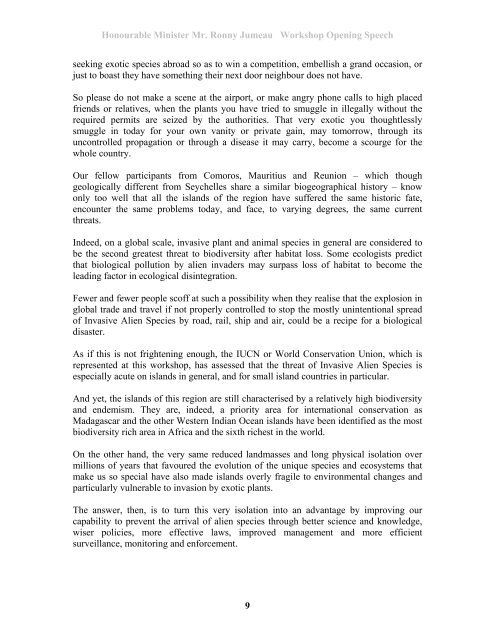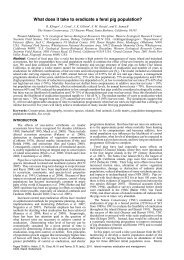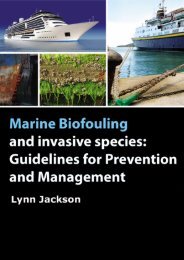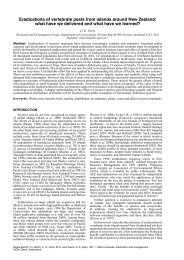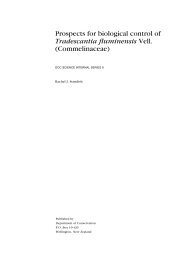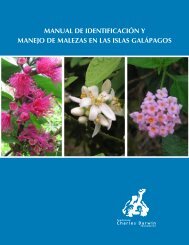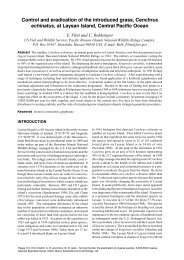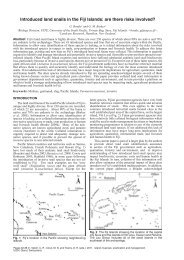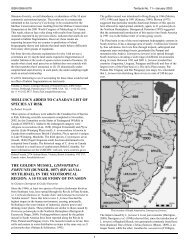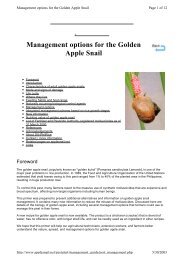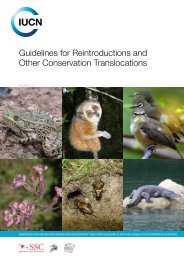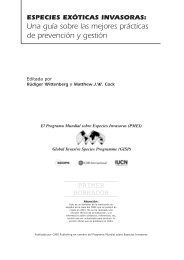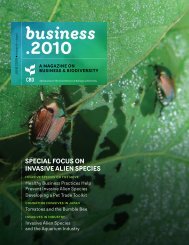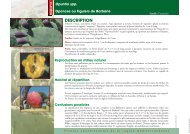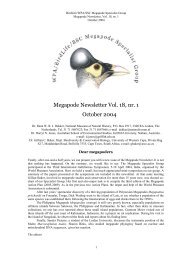Woody Invasive Species: A Regional Assessment - IUCN Invasive ...
Woody Invasive Species: A Regional Assessment - IUCN Invasive ...
Woody Invasive Species: A Regional Assessment - IUCN Invasive ...
You also want an ePaper? Increase the reach of your titles
YUMPU automatically turns print PDFs into web optimized ePapers that Google loves.
Honourable Minister Mr. Ronny Jumeau Workshop Opening Speech<br />
seeking exotic species abroad so as to win a competition, embellish a grand occasion, or<br />
just to boast they have something their next door neighbour does not have.<br />
So please do not make a scene at the airport, or make angry phone calls to high placed<br />
friends or relatives, when the plants you have tried to smuggle in illegally without the<br />
required permits are seized by the authorities. That very exotic you thoughtlessly<br />
smuggle in today for your own vanity or private gain, may tomorrow, through its<br />
uncontrolled propagation or through a disease it may carry, become a scourge for the<br />
whole country.<br />
Our fellow participants from Comoros, Mauritius and Reunion – which though<br />
geologically different from Seychelles share a similar biogeographical history – know<br />
only too well that all the islands of the region have suffered the same historic fate,<br />
encounter the same problems today, and face, to varying degrees, the same current<br />
threats.<br />
Indeed, on a global scale, invasive plant and animal species in general are considered to<br />
be the second greatest threat to biodiversity after habitat loss. Some ecologists predict<br />
that biological pollution by alien invaders may surpass loss of habitat to become the<br />
leading factor in ecological disintegration.<br />
Fewer and fewer people scoff at such a possibility when they realise that the explosion in<br />
global trade and travel if not properly controlled to stop the mostly unintentional spread<br />
of <strong>Invasive</strong> Alien <strong>Species</strong> by road, rail, ship and air, could be a recipe for a biological<br />
disaster.<br />
As if this is not frightening enough, the <strong>IUCN</strong> or World Conservation Union, which is<br />
represented at this workshop, has assessed that the threat of <strong>Invasive</strong> Alien <strong>Species</strong> is<br />
especially acute on islands in general, and for small island countries in particular.<br />
And yet, the islands of this region are still characterised by a relatively high biodiversity<br />
and endemism. They are, indeed, a priority area for international conservation as<br />
Madagascar and the other Western Indian Ocean islands have been identified as the most<br />
biodiversity rich area in Africa and the sixth richest in the world.<br />
On the other hand, the very same reduced landmasses and long physical isolation over<br />
millions of years that favoured the evolution of the unique species and ecosystems that<br />
make us so special have also made islands overly fragile to environmental changes and<br />
particularly vulnerable to invasion by exotic plants.<br />
The answer, then, is to turn this very isolation into an advantage by improving our<br />
capability to prevent the arrival of alien species through better science and knowledge,<br />
wiser policies, more effective laws, improved management and more efficient<br />
surveillance, monitoring and enforcement.<br />
9


